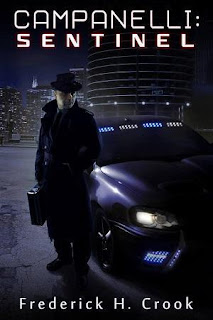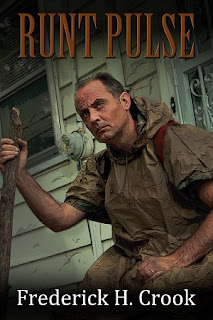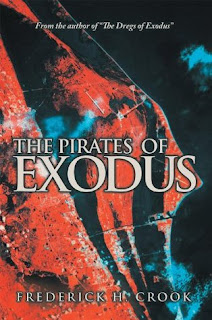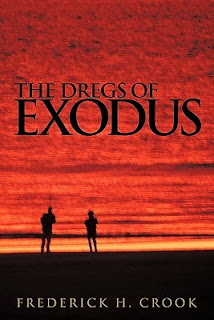Today we're bringing something different to Writing in the Modern
Age in the form of a character interview. These character interviews, now
and in the future, should prove to be very enlightening for all of us.
We have the pleasure of meeting Frank Campanelli, a character from Campanelli: Sentinel.
We'll get a chance to talk to the
author, Frederick H. Crook, in a bit, but now we have on the stage...Frank!
Interview
Marie Lavender: Hello, Frank. Please have a seat.
Character Frank Campanelli: Thank you. It's a pleasure to be here.
Character Frank Campanelli: Thank you. It's a pleasure to be here.
Marie: We're going to start out with some simple questions,
okay?
Frank: All right.
Marie: So, what is your occupation? Are you any good at
it? Do you like it?
Frank: I
am Captain of Detectives for the Chicago Police Department’s Sentinel Squad.
I’m a good detective, though I thought I was better at solving murders. The
powers that be saw fit to move me into this Sentinel group as
second-in-command. It beats fixing pot holes.
Marie: Okay. What is your
family like?
Frank: They
are dead and buried back home…New York City.
Marie: Oh, I'm so sorry to hear that.
If I may ask, what did your childhood home look like?
Frank: It
was this brick-faced two-flat in Queens. It was okay, I guess. The neighborhood
was rough, but not too bad. [Takes a filter-less cigarette from an inner pocket
of his dark blue suit jacket and lights it with a chrome Zippo.] The crimes
during the 'Great Exodus' were an interesting mix. Less murders, more muggings.
Lots of B & E’s. Criminals in the 2060’s and ‘70’s were looking for items
to fence for the cash to catch a starship for Alethea. That was the 'Great
Exodus' for you.
Marie: All right.
Do you have any hobbies? What do you enjoy
doing?
Frank: Tam
[Tamara Billingsley] and I like to go to the movies. There are a couple
theaters left in Chicago. We like the films from the middle of the 20th
century. We like to see the cities like they used to be, before so many
buildings were taken down. I also have a collection of photography books.
They’re antiques. I like to look at them and see how Chicago and New York
looked before the 'Exodus'.
Marie: So, what is your greatest dream, Frank?
Frank: I don’t know. That’s a tough question. What…I guess I should wish for a time machine or something. Ha! I wouldn’t know what to do with the thing if I had one, so forget it.
Marie: (Smiles.) All right.
What kind of person do you wish you could be? What is stopping you?
Frank: Who do I wish I could be? I think I’m doing pretty well as is. There aren’t a lot of choices these days as far as careers go. I’m happy to be a cop.
Marie: Well, I'm glad you found something you're happy with. Let's try something else.
Who was your first love?
Frank: [Blinks at the question, gives Marie a brief stare and takes a big puff from his cigarette.] Susan was my first love and my wife.
Marie: All right.
So, what's the most terrible thing that ever
happened to you, Frank?
Frank: Losing her, my son and my eyesight all in one night. Our apartment building in New York caught fire. [Crushes out cigarette into the ashtray.]
Marie: Dear God...I'm so sorry for your loss.
(Pauses.)
Let's try something else, shall we?
(Nods.)
What was your dream growing up? Did you achieve that dream? If
so, in what ways was it not what you expected? If you never achieved the dream,
why not?
Frank: Dreams again. [Smiles.] As far as I’m concerned, I’m living my dream. It’s the only thing I know how to do. Being a cop…on Earth.
Marie: Okay. So, who is your role model?
Frank: When I was a kid, it was my father. He was a cop. I followed his example, I guess, as I grew up.
Marie: Out of curiosity, is there someone you pretend to like but really dislike?
Frank: No. I never pretend. There are men on the force I respect but personally dislike. I think they know it.
Marie: All right.
Let's try another question.
Frank: To see this city survive. I want the waves of sickness to come to a stop and have our citizens find reasons to stay. Chicago used to have two-point-seven million people living here. Now there’s less than seven-hundred thousand. People are dying every day from influenzas and are risking everything to go against the law and catch the next starship to Alethea. It’s got to stop.
Marie: (Nods.) I think you're heart is certainly in the right place. One more question...
So, what is your greatest fear?
Frank: [Laughs…perhaps nervously.] I’m afraid I’m going to wake up one morning and be the last cop in town. I have nightmares about it sometimes.
Marie: Oh...I see.
Well, it looks like we're running out of time, Frank. Thank you
for visiting us today.
Frank: Thank you for letting me visit.
Marie: Of course! I wish you
luck with everything. It was so interesting getting to know you. (Waves at her guest as he heads off the stage.)
Now, let's shift over
and get the author's perspective. We have fellow Solstice author Frederick H. Crook on the stage
today! Hi, Fred!
Author Frederick H. Crook:
Hello, Marie!
Marie: (Smiles.) Welcome to Writing in the Modern Age.
We just
got to talk to the hero of your story, Frank Campanelli. Quite an interesting
character. Can you tell us a little about him?
Frederick: He’s a fighter. A regular guy stuck in an irregular
situation. That’s where heroes shine.
Marie: So, what are your character's greatest
strengths?
Frederick: He will
absolutely not quit. He’s dedicated to his job and cares about the city and the
people.
Marie:
I can certainly respect that. What
are his greatest weaknesses?
Frederick: Perhaps his strengths are his weaknesses. He’s found himself in situations before where, no matter what he did, he couldn’t help someone. It destroys him a little bit inside each time that happens.
Marie: (Nods.) That's understandable. We all want to feel like we're making a difference somehow.
So, what are some of his favorite foods?
Frederick: Well, he lives not too far from Chinatown in Chicago. He finds himself there quite a lot, eating Chinese food for lunch with his partner, Marcus Williams. Otherwise, the food that Tamara brings him from her diner is just fine with him.
Marie: Okay. What's a positive quality that your character is unaware that he or she has?
Frederick: I’m not entirely sure he’s aware of it or not, but even though he doesn’t really agree entirely with the anti-migration law, he’s stuck enforcing it and he does so with little discussion. He’s loyal to the City of Chicago and to the laws of the land.
Marie: Will readers like or dislike this character, and why?
Frederick: They should see the quality of this man and love him for it. He’s a blind man that has lost everything and has risen above it to remain an effective police detective.
Marie: How admirable!
Well, now that we have a real taste of Frank, we have a few questions for you as well as the author.
What first gave you the idea for Campanelli: Sentinel?
What first gave you the idea for Campanelli: Sentinel?
Frederick: I had written The Dregs of Exodus which happens in 2139, then realized that my mind kept thinking about how in the world we got to that point. So, the next book, The Pirates of Exodus takes place in 2129. Then I wrote a bunch of short stories that were scattered from one place to another, each one happening further and further back in time. When I wrote the dystopian crime thriller, Campanelli: The Ping Tom Affair, I knew I wanted to explore this idea further. It’s the first time I’ve actually shifted the time lever into ‘forward’ since "Dregs”.
Marie: Fascinating!
Frederick: I’m actually a bit of both. I don’t type a word until the story is done in my head. Not word for word, but in an abstract way. I often describe it as building a railroad. You have to know where point A is, you have to understand the terrain that you need to build on, and point B needs to be clearly defined. The details of the story pop up in a natural fashion as I lay down the tracks, like a town that springs up along the route.
Marie: That's a great metaphor!
So, I’m throwing this one in for our aspiring
writers. Did you come across any specific challenges in writing Campanelli: Sentinel or getting it published? What would you do differently
the next time?
Frederick: I never have trouble writing. I have too many ideas and characters trapped in my head as it is. I did shop for a publisher for a time, but I found out in 2010, after submitting inquiry after inquiry, that the traditional publishing industry is terminally slow. I have no patience for a company that indicates a waiting period of six months or more just for a ‘yea' or 'nay’. I don’t have time for that crap. No writer should put up with it. Fortunately, I found Solstice just in time. I was going to self-publish it through Createspace. All I can say to anyone aspiring to become an author is, keep writing. Don’t stop after novel number one. Don’t wait for anybody or anything, because you can always let a company that shows interest publish another edition of your work. There’s no reason to let a manuscript remain a manuscript these days. Print it and get your readers. Let the industry catch up to YOU.
Marie: That's true! We have a more options these days than we used to.
Well, it was such a pleasure having you
here on Writing in the Modern Age, Frederick. We hope you can come back
sometime! :)
Readers, I hope you all get a chance to pick up a copy of this awesome book!
Here is the blurb for Campanelli: Sentinel.
It is 2110 and migration to the colony planet, Alethea, has depleted
Earth of billions of people. As a result, migration has been declared
illegal by all world governments. Human trafficking becomes highly
profitable for organized crime and their influence reaches beyond the
Earth’s atmosphere. Many starships returning from Alethea are diverted
from the scrapping process and secretly refurbished, allowing the
population to shrink further.
Frank Campanelli is a blind Chicago Police detective who depends on his fully functional bio-electronic implants to see and do his job. After assisting on a botched infiltration of a top human trafficking network, he and his partner, Marcus Williams, are transferred into the CPD’s Organized Crime Division to head the newly formed Sentinel group and bring down the Ignatola family business.
Frank Campanelli is a blind Chicago Police detective who depends on his fully functional bio-electronic implants to see and do his job. After assisting on a botched infiltration of a top human trafficking network, he and his partner, Marcus Williams, are transferred into the CPD’s Organized Crime Division to head the newly formed Sentinel group and bring down the Ignatola family business.
Wow! This book looks great!
About Frederick H. Crook:
 Frederick was born in Chicago in 1970 and now lives in Villa
Park with his wife, Rae and their three miniature dachshunds. He began by
writing fictional works all through high school, earned an Associate Degree of
Applied Science in Electronics in 1994 and the Bachelor of Science in Technical
Management from DeVry University in 2005.
Frederick was born in Chicago in 1970 and now lives in Villa
Park with his wife, Rae and their three miniature dachshunds. He began by
writing fictional works all through high school, earned an Associate Degree of
Applied Science in Electronics in 1994 and the Bachelor of Science in Technical
Management from DeVry University in 2005.
In 2009, Frederick began writing his first novel, The Dregs of Exodus, which was
self-published in late 2010. This was followed up with another novel, The Pirates of Exodus in 2012.
Throughout
that year and early 2013, he continued writing and published four short stories
in eBook form for Kindle and Nook. All of these stories share the same premise,
but all are independent from one another, though the short eBook, Campanelli: The Ping Tom Affair and his
third novel, published by Solstice Publishing, Campanelli: Sentinel, share the same main characters.
Minuteman Merlin was released for Kindle
by Solstice Publishing, March 1st of 2015.
He loves
writing and enjoys meeting and talking to readers at book signing events.
 Frederick was born in Chicago in 1970 and now lives in Villa
Park with his wife, Rae and their three miniature dachshunds. He began by
writing fictional works all through high school, earned an Associate Degree of
Applied Science in Electronics in 1994 and the Bachelor of Science in Technical
Management from DeVry University in 2005.
Frederick was born in Chicago in 1970 and now lives in Villa
Park with his wife, Rae and their three miniature dachshunds. He began by
writing fictional works all through high school, earned an Associate Degree of
Applied Science in Electronics in 1994 and the Bachelor of Science in Technical
Management from DeVry University in 2005.
Author Links:
Twitter: https://twitter.com/FrederickHCrook
Amazon Author Central: http://www.amazon.com/Frederick-H.-Crook/e/B00P83FW02/
Publisher: http://solsticepublishing.com/frederick-h-crook/
Amazon Author Central: http://www.amazon.com/Frederick-H.-Crook/e/B00P83FW02/













Thank you for the Q&A's. Great and interesting information and I like to hear what other people do in their life. Makes me want to read countless more books on my Have to Read list. :)
ReplyDeleteThank you for stopping by, Jeanette! :)
DeleteThis was fun, Marie. Thank you for featuring my work and for the interview. I appreciate you a lot.
ReplyDeleteMy pleasure! Thank you! :)
Delete